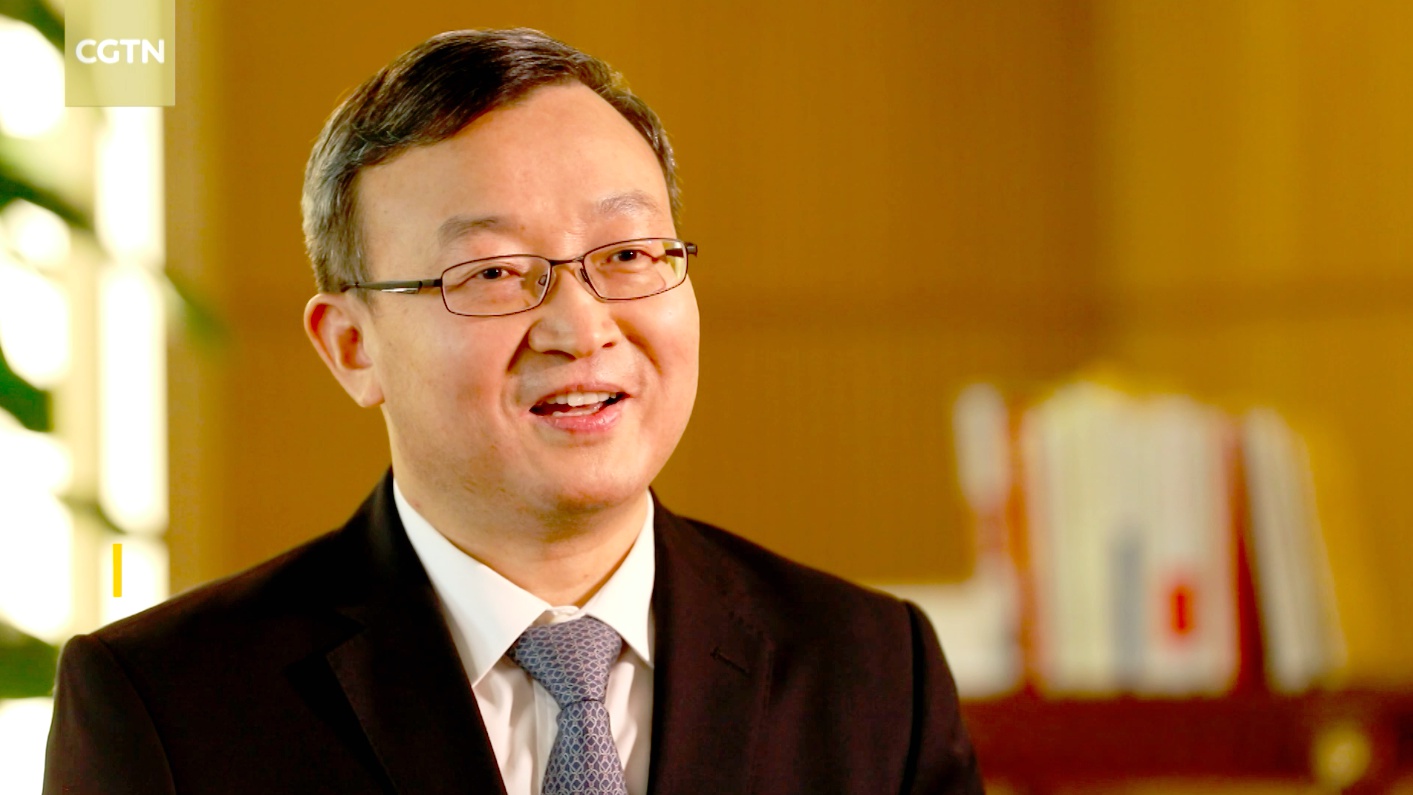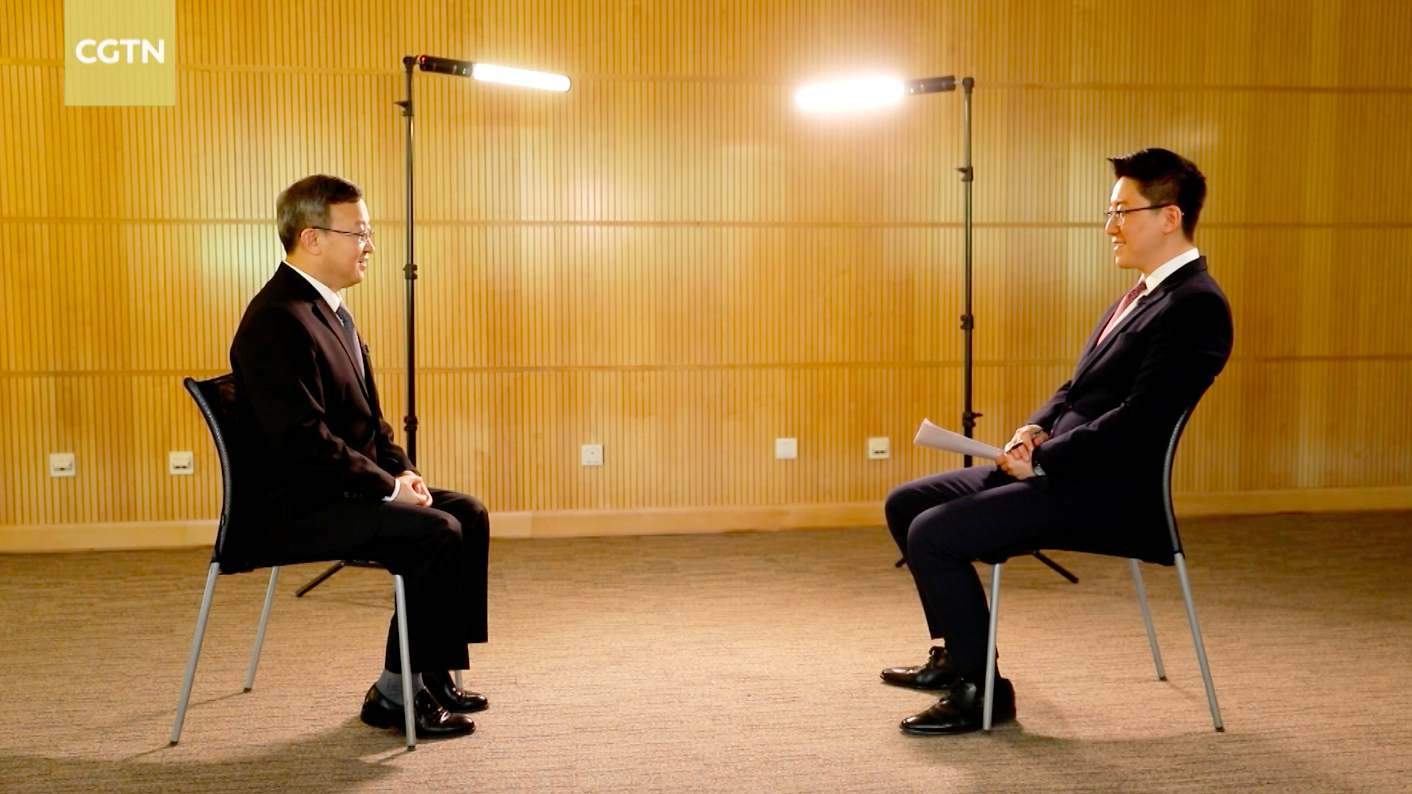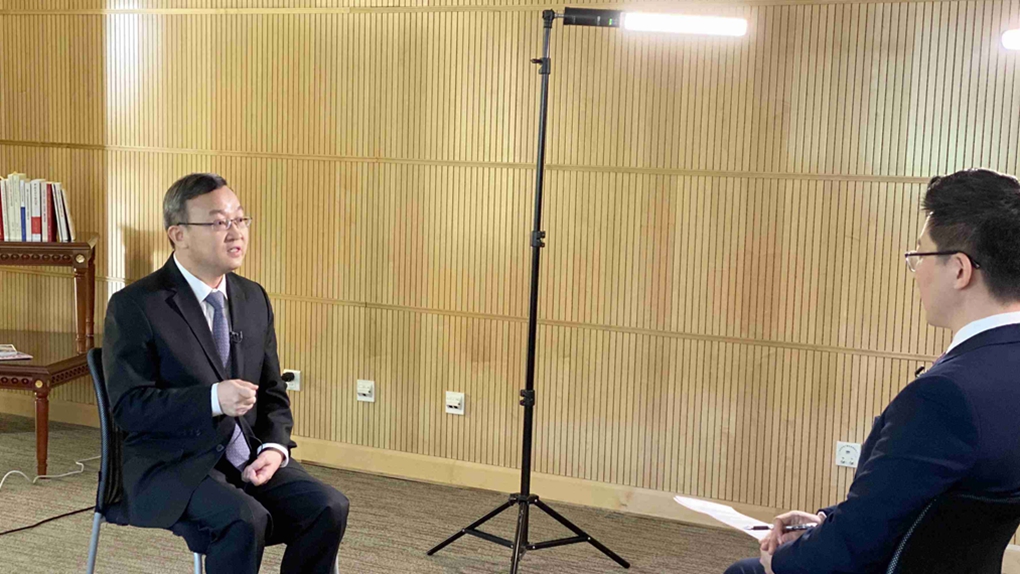24:15

China will further open up its economy and welcome foreign investors to China. This was the message from Vice Commerce Minister Wang Shouwen in an exclusive interview with CGTN anchor Michael Wang on Sunday.
The vice minister is confident that China remains a very competitive supply chain location, highlighting that supply chains in China are reliable and less vulnerable to disruptions.
Wang detailed MOFCOM's efforts in fighting the coronavirus outbreak, supporting the reopening of businesses and further improving China's investment environment.
He also spoke about regional cooperation, new pilot Free Trade Zones to be set up and the long term potential of the Chinese economy.
Despite the COVID-19 pandemic, Regional Comprehensive Economic Partnership (RCEP) members aim to sign the RCEP agreement by the end of this year, according to the vice minister.
Vice Minister Wang Shouwen also told CGTN that China-Japan-South Korea Free Trade Agreement (CJK FTA) negotiations will build upon RCEP achievements. In spite of the disruptions caused by the pandemic, the three countries have a kept in close touch and agreed to hold the next round of CJK FTA negotiations as soon as possible.
Full interview script is below:
Q: Can you give us a sense of what policies the Ministry of Commerce has introduced to fight COVID-19 and how these policies worked to help spur the reopening of businesses.
Wang: As the fight against COVID-19 made a lot of progress and the risks in other places than Hubei Province were kept low, President Xi Jinping made the decision to prudently reopen China's economy while effectively maintaining epidemic control. The country as a whole was divided into high risk, medium risk and low risk areas. We at MOFCOM (the Ministry of Commerce) acted quickly to follow through on the president's instructions.
We started off with the essential goods suppliers in early February, we allowed domestic trade companies to reopen their businesses based on a risk assessment. For high-risk areas, it was wholesalers and supermarkets that were allowed to open. For the medium- and low-risk areas, department stores and shopping centers were also permitted to open their businesses.
As you know, during the COVID-19 pandemic, foreign trade companies and foreign-invested enterprises were hit hard. They had difficulties in starting their business. So MOFCOM has encouraged the use of paperless processing of import and export documentation. We have reduced the paperwork required. As a result, we have been able to minimize in-person contact and the time required to examine and approve those documents and applications.
We understand that for the entire supply chain to work, the companies in the pivotal positions as well as their major suppliers will have to open their business at the same time. And Hubei happens to be the home of major auto production bases in China. We have helped the key auto parts suppliers in Hubei Province, about 20 of them, to open so that they could supply parts and components to their downstream clients based elsewhere in China.
We also understand that to reopen economy means to keep the economy open. So we encourage Chinese businesses to make full use of China-Europe Block Train Service at a time when logistics is so important to keep trade afloat. MOFCOM has also played an important part in international cooperation in the fight against the virus. We have facilitated the export of huge amounts of medical supplies to 200 countries and regions.

China will further open up its economy and welcome foreign investors to prosper in China. This is the message reaffirmed by vice commerce minister Wang Shouwen in an exclusive interview with CGTN anchor Michael Wang on Sunday. /CGTN
China will further open up its economy and welcome foreign investors to prosper in China. This is the message reaffirmed by vice commerce minister Wang Shouwen in an exclusive interview with CGTN anchor Michael Wang on Sunday. /CGTN
Q: What did the Ministry of Commerce do in coordination with other ministries and provinces to jointly fight COVID-19?
Wang: In the battle against the COVID-19, MOFCOM is not acting alone. We have fought shoulder to shoulder with our colleagues in other ministries and colleagues in the provinces. One of MOFCOM's top priorities is to make sure there is an adequate supply of essential goods in the marketplace.
At the beginning of the outbreak, Hubei suffered a serious shortage of daily necessities. So MOFCOM led the effort to establish a nine-province "supply coalition." Chongqing, a member of the coalition, made available 400 tons of vegetables and had them sent to Wuhan within two days. Hunan, another member of the coalition, provided one million lunchboxes to the city within one week's time.
MOFCOM also joined the efforts in preparing firms in opening their businesses. Before opening, companies need to figure out what to do, what to prepare for in the midst of the epidemic. So MOFCOM and the National Health Commission jointly issued guidelines for retailers for restaurants and other businesses, on such matters as staff temperature checks, workplace ventilation and workplace disinfection.
To reboot economic activities in the Yangtze River Delta, MOFCOM advocated for Shanghai Municipality and the provinces of Jiangsu, Anhui and Zhejiang to form a cooperation mechanism among themselves. They recognized each other's health QR codes and freight passes in the effort to facilitate the free movement of people and cargo across the whole Yangtze River Delta.
Q: One of the more vulnerable groups to the coronavirus has got to be the medium-sized, smaller and micro enterprises which make up the bulk of businesses here in China. What has MOFCOM done to support these smaller businesses in getting through the pandemic?
Wang: Mini, small and medium sized enterprises (MSMEs) have taken a severe battering from the COVID-19 pandemic. The central government in China has adopted a host of policies to support these small businesses, for example, by taking tax cuts, rent cuts and cuts in their utility bills. MSMEs are also facing a shortage of working capital. So banks in China are advised to take into account their hardships when making lending decisions. The MSMEs are allowed to defer their loan payments until the end of March next year.
On the part of MOFCOM, we have supported banks to better customize their services to the small- and medium-sized enterprises by setting up direct online channels. We have also expanded the coverage of export credit insurance so that MSMEs could better cope with export-related risks. We have also been able to curtail the time required for value-added tax refunding for exports of the MSMEs from about one dozen days to just one week.
MSMEs rely heavily on on-site trade shows, trade fairs and exhibitions to win orders. As the pandemic made it practically impossible to organize those on-site events, MOFCOM decided to move the upcoming Canton Fair online and we would allow all the participants in the online Canton Fair, including MSMEs to participate in it free-of-charge. We have also stepped up our efforts to help MSME exporters switch more to the domestic market when they are faced with difficulties in exporting their goods and services abroad.

Q: Foreign-invested enterprises are an important part of China's economy. How has the ministry assisted these foreign firms based in China throughout this health crisis?
Wang: Foreign-invested enterprises (FIEs) have played a much valued role in China's economy and we offer to them the same treatment as we do to other Chinese firms. On top of that, we have taken additional measures to help them address their concerns. For example, MOFCOM has set up a special task force, helping them to solve their difficulties. We have opened a service hotline and designated a part of MOFCOM's website for foreign-invested enterprises.
A foreign-invested enterprise in China cannot operate if its suppliers do not operate to provide them with the necessary parts and components, and this is exactly the situation faced by FIE auto companies like BMW, like Volkswagen and Hyundai in China. Some of their suppliers are located in Hubei Province.
So, we help those key parts and components suppliers in Hubei Province resume production so that they could provide parts and components to downstream clients like the auto companies I have just mentioned. In addition, we have also helped other companies like Panasonic, Ericsson, so on and so forth by helping their suppliers resume production.
As you could imagine, many foreign-invested enterprises in China have expatriate employees. These employees need to come back to China to work. So MOFCOM has worked with other ministries to provide them with visa support and other related arrangements.
China has worked with Singapore, South Korea, Germany and France in reaching a fast track mechanism to help with visa arrangements and other related matters. And with regard to those expatriates from countries which we do not have such a mechanism available at the moment, we look for solutions for those expatriates on a case-by-case basis. For your information, we are working very industriously with other countries on such similar arrangements.
In addition, my colleagues and I have reached out by teleconference to AmCham China, the European Chamber of Commerce in China and over 600 foreign-invested enterprises. Those chambers, the foreign-invested enterprises welcome this dialogue and discussions with MOFCOM and they find these discussions very useful.
I'm very glad to tell you as we speak now about 86.5 percent of the surveyed foreign-invested enterprises in China have resumed production and they are now running at a capacity of about 70 percent. I also want to assure the foreign investors in China that we are further opening our economy up. We are further improving our investment environment. We welcome them to invest in China to prosper with us in China.
Q: Are you concerned at all that industrial chains may leave China? What are the advantages that make China's industrial and supply chains so resilient?
Wang: Some people say that the pandemic is "a wake-up call for foreign invested enterprises in China, maybe it's time to move out." I'm not very much worried about it, frankly speaking, because of all the foreign-invested enterprises in China, about 91 percent of them are focusing on China's domestic market. Nine percent of them are export oriented.
As we all know, the Chinese domestic market is expanding, growing very fast. Definitely the FIEs focusing on China's domestic market will further expand their supply chains in China. With regard to those export-oriented FIEs, I personally think and I am pretty confident that China remains a very competitive supply chain location, because there are few countries in the world that can match China where you can find almost everything you need to build something.
China has a broad spectrum of strong upstream suppliers and downstream clients, making supply chains in China reliable and less vulnerable to disruptions. China also enjoys the advantages of the economies of scale and the competitive labor cost, which makes supply chains in China scalable, extendable and very cost effective. In addition, in terms of logistics, which is critical to the safety of supply chains, China is well connected to the rest of the world by rail, by air and by sea.
I can give you some examples. Apple has a number of production facilities in China for making iPhones. Its supply chain in China has been very resilient, experiencing only a few hiccups during the outbreak. Another example is Tesla, Shanghai. It has been running quite well with only a few days of downtime caused by the outbreak of the coronavirus.
China has a good environment to sustain the supply chains in our country. Nonetheless, President Xi Jinping at the Extraordinary G20 Leaders' Meeting emphasized the importance of maintaining global industrial and supply chains. The G20 Trade Ministers meeting also pledged to promote open and resilient supply chains. So we are working with colleagues from other economies to deliver on those commitments.

Night view of Shenzhen, Guangdong Province, China. /VCG
Night view of Shenzhen, Guangdong Province, China. /VCG
Q: What opening-up policies can we expect from China this year? We heard from the 2020 government work report that new pilot Free Trade Zones will be opening up and the negative list for foreign investment will be significantly shortened. So what's MOFCOM's view on all of this?
Wang: Premier Li Keqiang emphasized in his government work report for 2020 that China will further open its economy up and China will make better use of foreign investment. We at MOFCOM are working hard to implement that.
China is already a very open economy. Today, foreign investment is restricted or prohibited in only 40 areas or activities and all these 40 areas appear on a negative list for foreign investment. China started to publish that negative list six years ago. That was in 2013.
At that time, the negative list contained 190 areas, so today it's 40 areas, so it's already a big cut. And this year, we are going to announce another major cut in the negative list and foreign investors will have more and greater business opportunities in China.
You have mentioned Free Trade Zones (FTZs), for your information we have setup 18 FTZs across the country over the past six years. These FTZs have played a very important role in China's opening-up, in terms of trade and investment liberalization and trade facilitation, financing so on and so forth. And these FTZs have been very popular with foreign-invested enterprises.
Last year, these 18 FTZs attracted 15 percent of China's total inbound investment. And this year, we are going to announce more FTZs to be set up. And we are going to empower those FTZs to carry out more reforms and incubate more best practices and improve their investment environment for both Chinese and foreign investors alike.
Q: Given all the uncertainties that we see with COVID-19 in the global economy, how are talks progressing for the Regional Comprehensive Economic Partnership (RCEP) as well as for the China-Japan-South Korea Free Trade Agreement?
Wang: Despite the COVID-19 pandemic, RCEP members aim to sign RCEP agreement by the end of this year. This is actually a commitment made by RCEP leaders when they met in Bangkok last year.
It is true at the very beginning of the coronavirus outbreak, the meetings of RCEP were disrupted. But quickly RCEP members shifted to virtual meetings and have made a lot of progress ever since. So far we have finished 80 percent of the legal scrubbing and we would expect that we will be able to clear all the remaining issues by the end of June this month.
I believe RCEP will go a long way towards regional economic recovery post pandemic. RCEP will be one of the largest, if not the largest, trading blocs in the world. It will help harmonize trade rules in this region. It will enhance supply chains and value chains.
It will also promote regional economic integration, trade promotion by eliminating over 90 percent of the tariffs on goods being traded in this region. And RCEP will also be a strong boost to an open global economy. It will also significantly contribute to the world trading system.
ASEAN has always played a central role in the RCEP negotiations and China continues to support the centrality of ASEAN in this endeavor.
China, Japan, and South Korea are committed to the CJK FTA negotiations. In spite of the disruptions caused by the pandemic, the three countries have a kept in close touch and agreed to hold the next round of CJK FTA negotiations as soon as possible.
The CJK FTA negotiations will build upon RCEP achievements. It will further liberalize market access for trade-in-goods, trade-in-services and investment. It will also strengthen IPR (Intellectual Property Rights) protection and the regional supply chain, among others. I would say that the three countries all aspire to reach a comprehensive, high quality, mutually beneficial FTA with its own value.

Vice Commerce Minister Wang Shouwen is in an exclusive interview with CGTN anchor Michael Wang. /CGTN Photo
Vice Commerce Minister Wang Shouwen is in an exclusive interview with CGTN anchor Michael Wang. /CGTN Photo
Q: What are your thoughts on the long-term potential and development prospects of the Chinese economy?
Wang: In recent years, China has been shifting its growth engine from export to domestic demand, particularly domestic consumption. As a result, China's export ratio to GDP fell to 17.4 percent last year from 31.4 percent in the year 2008.
Correspondingly, China's current account surplus shrunk to one percent as a ratio to GDP compared with 9.1 percent in the year 2008, so you can see the significant shift in the structure of the economy. Today consumption, domestic consumption, contributes close to 60 percent of China's GDP growth. This gives China greater wiggle room to maneuver when faced with external shocks.
So personally speaking, I am very optimistic about the long-term economic outlook in China. I say so for two good reasons.
Firstly, China is becoming a powerhouse for innovation. Last year, the research and development spending of China amounted to 2.2 percent of its GDP. This is relatively a high figure by international standards. And each year China produces eight million strong graduates, including three million engineering students. This ensures a steady supply of creative talent. Actually, China is already one of the most innovative countries as measured by patent applications.
The second reason is that China has a huge market of 1.4 billion consumers, including 400 million middle incomers and 900 million internet users with a per capita income of 10,000 U.S. dollars and a service sector making up 54 percent of the economy. China's domestic market holds even greater growth potential. All this means immense opportunities for the rest of the world.
For your information, China will host the third China International Import Expo in the coming November. And China will import in total 30 trillion U.S. dollars worth of goods in the next 15 years. So if history is any guide, China will only succeed when our partners do and the world will be a better place if we all win.